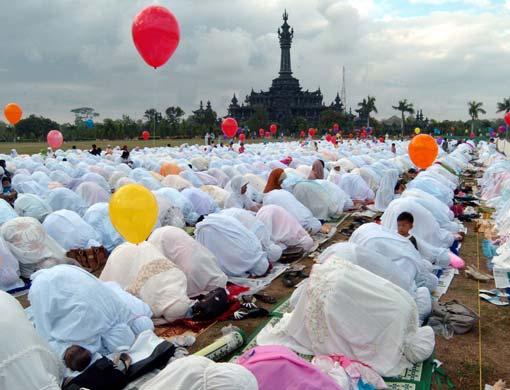E I D MUBARAK
Hey guyzz.......Eid Mubarak to all of you........... Thanx for keeping this forum active.....Enjoy your Eid Abt Eid......Eid ul-Fitr or Id-ul-Fitr (Arabic: ??? ????? 'Idu l-Fi?r?), often abbreviated to Eid, is a Muslim holiday that marks the end of Ramadan, the Islamic holy month of fasting. Eid is an Arabic word meaning "festivity", while Fi?r means "to break fast"; and so the holiday symbolizes the breaking of the fasting period. It is celebrated after the end of the Islamic month of Ramadan, on the first day of Shawwal.
Eid ul-Fitr is a day long celebration and is sometimes also known as the "Smaller Eid" (Arabic: ????? ?????? al-'idu ?-?aghir?) as compared to the Eid ul-Adha that lasts four days and is called the "Greater Eid" (Arabic: ????? ?????? al-'idu l-kabir?).
Muslims are commanded by the Qur'an to complete their fast on the last day of Ramadan and then recite the Takbir all throughout the period of Eid[Qur'an 2:185 (Translated by Shakir)].
Common greetings during this holiday are the Arabic greeting 'Id mubarak ("Blessed Eid") or 'Id sa'id ("Happy Eid"). In addition, many countries have their own greetings based on local language and traditions.
Typically, Muslims wake up early in the morning and have a small breakfast (as a sign of not being on a fast on that day) of preferably the date fruit, before attending a special Eid prayer (salah) that is performed in congregation at mosques or open areas like fields, squares etc. Muslims are encouraged to dress in their best clothes (new if possible) for the occasion. No adhan or iqama is to be pronounced for this Eid prayer, and it consists of only two raka'ahs. The Eid prayer is followed by the khutbah (sermon) and then a supplication (dua') asking for forgiveness, mercy and help for all living beings across the world. The khutbah also instructs Muslims as to the performance of rituals of Eid, such as the zakat.[1] It is then customary to embrace the persons sitting on either side of oneself, whilst greeting them. After the prayers, people also visit their relatives, friends and acquaintances[2] and some people also pay visits to the graveyards (ziyarat al-qubur).
Eid al-Fitr marks the end of the fasting of Ramadan. This has to do with the communal aspects of the fast, which expresses many of the basic values of the Muslim community. Fasting is believed by some scholars to extol fundamental distinctions, lauding the power of the spiritual realm, while acknowledging the subordination of the physical realm.[2]
The Islamic tradition also associates events with the occasion. For example, on Eid al-Fitr, the angelGabriel descended with white clothes for each of prophet Muhammad's grandsons.[






























